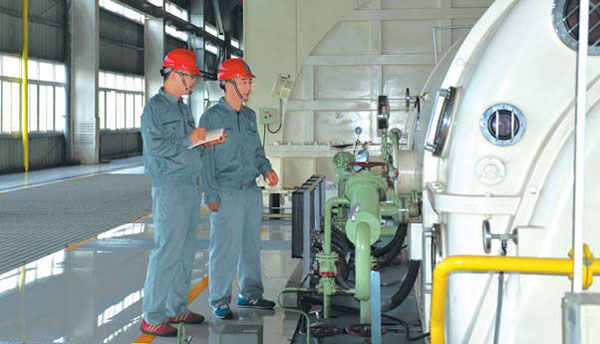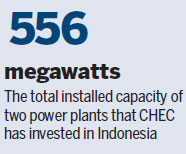Belt and Road Initiative is fertile ground for CHEC's sustained growth
Beijing-headquartered China Huadian Engineering Co Ltd has taken the lead in China's Belt and Road Initiative by successfully developing overseas markets, thanks to its advanced engineering technologies and experience in managing major infrastructure construction, as well as investment ability, management of operation.
Two of its coal power station projects on Indonesia's Batam and Bali islands have won industry-wide praise, and are seen as role models for future Belt and Road infrastructure investments.

Engineers at China Huadian Engineering Co Ltd examine a machine. The CHEC has always considered how to use modern technological ideas in its management and operations. Photos provided to China Daily
For the projects, two units, each with an installed capacity of 65 megawatts, were built in Batam, and three units, each with an installed capacity of 142 mW, were built in Bali.
Another leading project is a power plant with two units of 660mW in installed capacity in Vietnam, construction of which will start soon.
Focusing on research and development, the company is on the road to building more excellent projects at home and abroad.
CHEC is an affiliated enterprise of China Huadian Corporation, one of the nation's largest power generation enterprises.
Under China Huadian's overall development strategy, CHEC has become a large State-owned enterprise with competitive advantages in developing its core business in engineering technology industry, high-tech products research and development and manufacturing, engineering design and energy performance contracting, and energy technology research and services.
CHEC is engaged in various domains of prime contracting of project construction and services applied in industries such as electric power, petrifaction, harbors, metallurgy, mining, civic works and new energy engineering.
So far, the company's overseas branches have successfully completed five Engineering Procurement Construction projects, or the EPC projects.
In Indonesia, the company built the Indorama coal-fired power plant with two 30-mW units, and the Lafarg coal-fired power plant with two 16.5-mW units, as well as a project in Asahan with two 90-mW hydropower units.
It has also completed two projects in Cambodia: a 338-mW hydropower station and a power plant with two 60-mW coal-fired units. In addition, the construction of a coal-fired power plant with two units of 35mW is still underway.
Roadmap
Based on its successful experience in promoting EPC businesses, CHEC is considering developing a business model of "Investment plus Construction plus Operation".
CHEC's overseas branches have founded five permanent organizations in Southeast Asia, and Central and Eastern Europe.
Two power plants that CHEC invested in have started operations, with a total installed capacity of 556 mW. Another project is planned to have an installed capacity of 1,320 mW.

So far, CHEC's overseas branches have formed core businesses focusing on investment, project construction, operation and management in industries such as thermal power, hydroelectricity and wind power stations, and built an integrated business model of "Investment plus Construction plus Operation".
CHEC's coal-fired power plant in Bali is the largest overseas project invested in by the company. It was also the second project CHEC invested in,after the Batam coal-fired power plant.
CHEC has always focused on the quality and safety of these projects.
The total installed capacity of the Bali coal-fired power project, which is the island's largest power station, is 426 mW.
Construction work started in middle 2012. Three years later, on Aug 1, 2015, after an excellent trial period, the power station started operations.
It is one of the best demonstration projects built by Chinese enterprises.
The Bali power plant hired CHD Power Plant Operation Co, which accumulated extensive experience during the Batam project, to do daily maintenance work.
After going into operation, the Bali power plant highlighted production safety, equipment management and its energy-consumption index.
The availability ratio of the plant reached 83 percent in the first contract year, which was one percentage point higher than the agreed figure.
This achievement was highly appreciated by the local grid company as it helps the island to close power plants that use oil or emit too much pollution.
As an enterprise focusing on innovation and R&D, CHEC has always considered how to use modern technological ideas in its management and operations. CHEC insists on a sustainable development road with local people.
The company sent an excellent management team to the Bali project and tried to merge into local society and understand local culture. Advanced planning and an optimized management model have become guarantee that the project was carried out smoothly and in an environmentally friendly way.
The Bali power plant showed respect for religions of local people, and built Masjids and temples for Muslim and Hinduism employees. On important religion festivals, including Eid al Fitr and Id al-Adjha, the management of the power plant granted holiday bonus and articles for local employees and villagers.
The Bali plant has maintained a close relationship with local government departments, contractors, consultant companies, Chinese organizations and the embassy.
In addition, it has paid great attention to supporting local education and infrastructure construction. Since 2013, the plant has helped build three schools and five mosques. About 1,000 students and more than 5,000 local people have benefited from these acts.
The company expects the landscape project to become environmentally friendly and achieve top quality in operation, management and technology.
Environmental protection has been considered closely by the Bali power plant. Building and operating a coal-fired power plant on the island, which is also a world famous tourist spot, makes heavy requirements on the environment.
The enclosed circular coal yard was built to reduce the dust of coal during storage and usage, which is the first one in Indonesia.
The plant's all indicators meet the requirements of the local environment.
In a bid to make control of the impact of the plants on the local environment, CHEC acted according to local conditions and took many measures to reduce emissions.
Construction on the two units of the 65mW Batam coal-fired power plant started on March 1, 2011, and the plant started commercial operations in 2012, setting a record in Indonesia for its construction speed.
Batam Island is one of Indonesia's key industrial bases, but poor electricity power infrastructure had prevented rapid development of the local economy.
The operation of the Batam coal-fired power plant has greatly improved the local power supply.
It now generates about one-third of the electrical power on the island. With an improved power supply, more enterprises and businesses have become confident about investing in the island.
CHEC's keys to success lie in its scientific development and mature technologies, project-management experience and a strong team of professionals and international manpower.
Benefiting from the country's Belt and Road Initiative, the company is expected to make greater achievements in overseas plant investment and EPC constructions.

A view of China Huadian Engineering Co Ltd's Bali Island coal-fired power station. Two of its coal-fired power projects on Indonesia's Batam and Bali islands have won industry-wide praise and are seen as role models for future Belt and Road infrastructure investments.

















